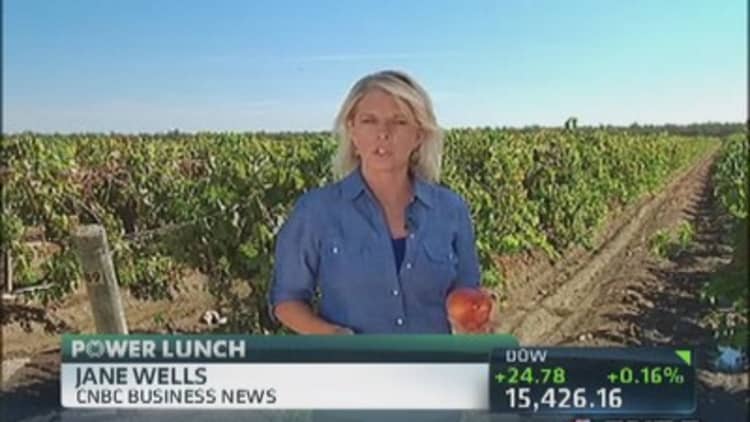A group of California farm workers for the nation's largest peach operation voted on whether to kick out or accept representation by the United Farm Workers. That was last November.
They still don't know the results of the vote.
The state's Agriculture Labor Relations Board (ALRB) won't reveal the vote pending the outcome of an investigation into the voting. The investigation has been going on for months, and no one knows when it will be completed. In the meantime, the ALRB appointed a mediator who wrote up a three-year contract that, under California law, can unilaterally be imposed on the farmer, Dan Gerawan. He's gone to court to stop that.
"The contract was written by the government itself," Gerawan said. "Not even the employees have a say in what goes in that contract."
Welcome to California, where there is no drought at all when it comes to drama in the Central Valley.
In the most contentious standoff between a union and a farmer since Cesar Chavez boycotted table grapes, the case of the UFW against Gerawan Farms has an unusual twist: It's the workers who may not want the union.
Read MoreCalifornia drought worsens: 'May have to migrate people'
CNBC first spoke to Gerawan and worker Silvia Lopez last year. The UFW was certified to represent farm workers on Gerawan's operation in 1992, but he said the union walked away without negotiating a contract and never returned.
Twenty years later, in 2012, the UFW was suddenly back and demanding a contract. Gerawan Farms is a huge employer in the Central Valley, and the union has suffered a decline in membership and funding. Gerawan said he was forced to negotiate by law, but his workers—most of whom had never been told they had UFW representation and weren't working at the farm in 1992—balked at the idea of giving over 3 percent of their pay in union dues. Their wages are already higher than competitors'. Lopez fought for the right to decertify the union, and after a few setbacks, workers eventually voted in November 2013.
A person who answered the phone at the UFW's offices told CNBC that no one was available for comment.
See the video below for CNBC's report from last year on the situation at Gerawan Farms.

The results of that vote have never been made public, as an investigator has been examining allegations that Gerawan unlawfully promoted the decertification vote. Gerawan denies those charges. A hearing is scheduled for next month, and the votes could finally be revealed then, but that "can only go forward if the General Counsel has completed her investigation of this charge," the ALRB's J. Antonio Barbosa said.
In the meantime, the state's 5th District Court of Appeal is set to decide whether the contract the state mediator wants to force on the farm is constitutional. The three-year contract would force Gerawan to give 5 percent annual wage increases. Wages would range from $11.50 to $16 an hour in 2015, and piece-rate work (work paid by the tub for grapes) would rise from $3-$5.25 now to $4-$6.50.
The contract also dictates bonus pay rates and mandates that workers be laid off based on seniority. It also stipulates that workers could not be let go without cause and says that the farm would have to tell the UFW the identities of new employees within eight days of hire.
Read More
"I'm not going to force this contract on my employees," Gerawan said.
The mediator's report says the UFW reappeared out of nowhere:
"Undeniably, for a considerable period, the Union has absented itself from acting in any representative capacity for these employees," the report said. "The election which resulted in its certification occurred so long ago that it is highly unlikely that any members of its current work force participated in it. All other things being equal, the imposition of membership fees to support an organization that most of the Employer's employees have had little if anything to do with would appear to be a bit or an overreach."
It's not right to impose a contract on people that don't want it imposed on them.Dan Gerawanpeach grower
Nevertheless, a union contract has been drawn up and approved by the ALRB, and the only thing preventing its enforcement is Gerawan's court appeal. The UFW has accused Gerawan of costing his workers "millions of dollars in pay and benefits" by refusing to implement the contract. It also released a statement saying he fired a pro-union worker. Gerawan declined to comment on that situation.
With this backdrop, peaches are being harvested on Gerawan's farm without disruption, even as the UFW waits to see if it will prevail, even as the farm workers wonder what their pay will be and whether they'll have to pay dues, and even as Gerawan wonders how much control he will have over his future business.
Read MoreFrankenstates: Winning the agriculture tech war
The hearing on the decertification vote may start Sept. 29 and could last two months, pushing it past the anniversary of the vote itself. In the end, it's possible that the entire election could be thrown out, the votes never known, and a government-created contract put into effect. That's why Gerawan is spending furiously on his legal team and speaking to anyone who will listen.
"It's not right to impose a contract on people that don't want it imposed on them," he said.
—By CNBC's Jane Wells


